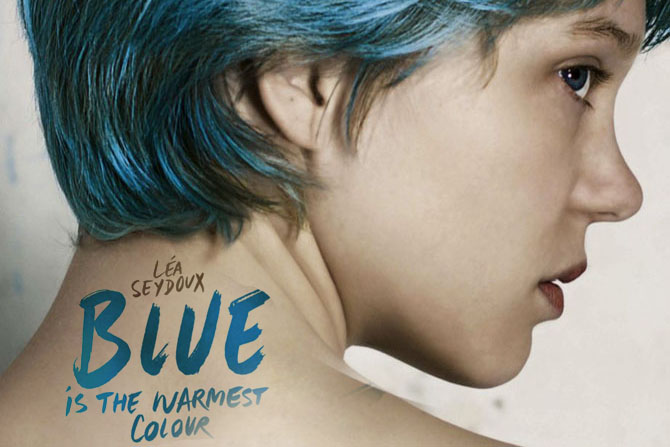
On the face of it a daunting prospect after a long hard day at work with its three hour length. This new French drama from director Abdellatif Kechiche is about the relationship between an artist (Emma) and a younger student (Adele) and arrives with glowing reviews, a Palme D’Or from Cannes, and a certain amount of controversy. The latter is because of the graphic lesbian sex scenes that are peppered throughout the film.
For some, the debate over the appropriateness of those scenes, how real they were and the director’s harsh treatment of the young actresses has unfairly overshadowed what they see as a classic movie. Whilst I was engrossed throughout most of the film, I tend towards the view that they add notoriety to what is a pretty basic tale of a couple meeting, forming a relationship, and then splitting up.
Maybe, it is an age thing on my part, that although praise has been heaped on Blue is the Warmest Colour for its realistic depiction of a relationship I found much less to identify with than I did, for example, in the recent Enough Said. It was hard to warm to many of the characters in the film. Adele’s friends are mean and spiteful (and then bizarrely just disappear from the film at the half way point).
Emma herself is difficult to like as she comes across as quite selfish and very hypocritical in her reaction when she suspects Adele of having an affair, as after all, she was in a relationship herself when she first got together with the younger girl. As for Emma’s friends, they may be terribly French, but are almost all pretentious bores!
Lea Seydoux’s performance of Emma is fine, if a little one note, but the acting plaudits have to go to Adele Exarchopoulos as Adele. She brilliantly portrays a girl at first very uncertain about her sexuality before blossoming into a more confident woman (except around Emma’s friends) before crumbling into a lonely desperate state when the relationship ends. Some of the best scenes are with her sensible and likeable parents, who also frustratingly don’t appear in the second half of the film, so we never find out if/how Adele tells them about her relationship with Emma.
The first couple of hours of the film depicting Adele’s life at school, some tentative encounters with girls and boys and the start of her relationship with Emma is fascinating. However, the last third of the film feels a bit soapy for my taste and does not hold together as well. Although I did find the last scene of the film pleasing in that it did not take the option of an easy happy ending.
As for the running time overall, I think it is unnecessarily long. Some judicious editing (including of some of the sauciest scenes which last for 10 minutes or more) could have made this a tighter film and a more satisfying experience. As it is, Adele Exarchopoulos’ performance alone make it something that you ought to see.